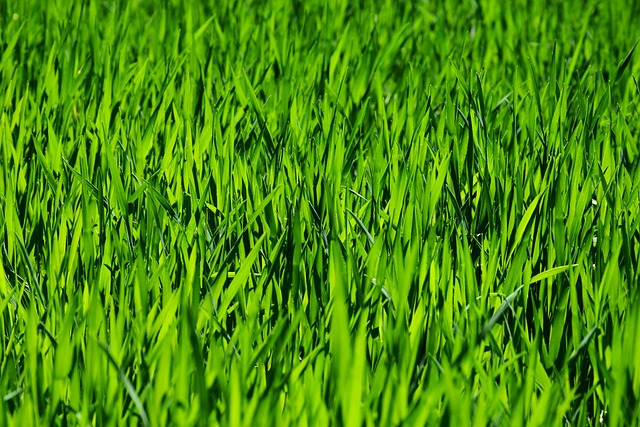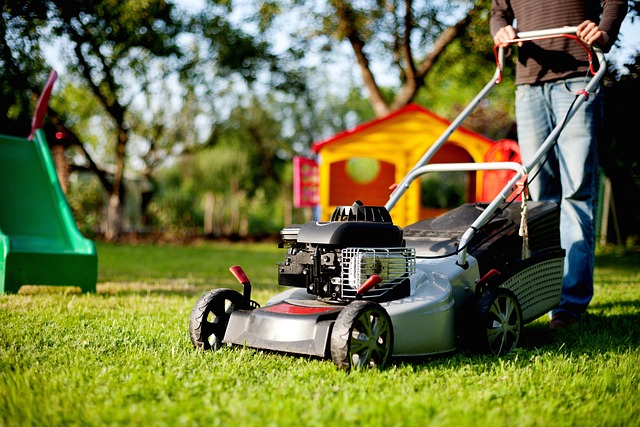Transforming your outdoor space into a sustainable and visually appealing oasis is achievable through modern lawn care practices and eco-friendly landscaping techniques. These methods not only enhance the beauty of your yard but also promote environmental health by conserving resources, enriching soil, and supporting local biodiversity. Smart irrigation systems ensure efficient water use while maintaining lush greenery, and composting organic waste improves soil fertility. By adopting native plants and xeriscaping principles, you can create a low-maintenance garden that thrives with minimal resources and offers habitat for wildlife. The shift towards bio-stimulants, organic fertilizers, and sustainable practices signifies a commitment to reducing the environmental impact of residential lawn care and landscaping, all while producing a harmonious blend of science, nature, and aesthetics. These eco-conscious choices contribute to global ecological efforts and offer homeowners a beautiful, sustainable outdoor environment that aligns with the growing trend towards environmental responsibility in lawn care and landscaping.
In today’s article, we explore the transformative power of residential outdoor spaces, offering insights into how homeowners can elevate their yards from mere extensions of indoor living to vibrant, multifunctional oases. With a focus on Lawn Care and Landscaping, this piece delves into innovative strategies that revitalize your lawn, integrates sustainable practices, and crafts an enchanting botanical haven. From assessing soil health to embracing smart irrigation systems, each section provides practical tips for maintaining lush green spaces and creating a year-round, aesthetically pleasing landscape. We also examine how to design outdoor living areas that seamlessly blend comfort with the natural beauty of your surroundings, complete with eco-friendly pest management and low-maintenance plant selections. Join us as we redefine the concept of home outdoor spaces and inspire you to embark on a journey to transform your yard into a beloved sanctuary.
- Revitalizing Your Outdoor Oasis: Innovative Lawn Care Strategies for a Vibrant Yard
- – Assessing and Improving Soil Health
Revitalizing Your Outdoor Oasis: Innovative Lawn Care Strategies for a Vibrant Yard

Revitalizing your outdoor oasis can be achieved through innovative lawn care strategies that breathe life into your yard, creating a vibrant and inviting space. Modern landscaping techniques have evolved beyond traditional methods, incorporating eco-friendly practices that not only enhance the aesthetic appeal but also promote environmental health. By integrating smart irrigation systems, you can optimize water usage, ensuring your lawn receives the right amount of hydration without waste. Composting organic matter enriches the soil, fostering a robust root system for lush, resilient grass. Additionally, the strategic use of native plants and xeriscaping principles can reduce maintenance while supporting local biodiversity. With the advent of bio-stimulants and organic fertilizers, lawn care has transitioned towards a more sustainable approach, minimizing chemical use and promoting soil vitality. These innovative strategies not only transform your outdoor space into a thriving ecosystem but also contribute to a healthier planet, making every blade of grass a testament to the synergy between science, nature, and beauty in landscaping.

The transformation of residential outdoor spaces has seen a significant shift towards sustainable and low-maintenance lawn care practices, reflecting an environmental consciousness among homeowners. Traditional lawn maintenance, characterized by frequent mowing, watering, and chemical treatments, is being replaced with landscaping designs that prioritize native plants, xeriscaping, and organic gardening methods. These eco-friendly approaches not only conserve water and reduce the carbon footprint but also create visually appealing and diverse habitats that support local wildlife. Homeowners are increasingly opting for lawn care solutions that offer both aesthetic appeal and environmental benefits, marking a departure from the resource-intensive landscaping of the past.
In the realm of modern landscaping, the integration of smart irrigation systems and drought-resistant vegetation has become a norm. These advancements in outdoor space management are not only cost-effective but also contribute to the conservation of natural resources. Additionally, the use of permeable surfaces and rain gardens has become more prevalent, allowing for better water management and reducing the risk of flooding. Landscaping companies are at the forefront of this green revolution, offering tailored solutions that cater to individual preferences while adhering to sustainable practices. The result is a harmonious blend of functionality and beauty that enhances the living experience and respects the environment.
– Assessing and Improving Soil Health

In recent years, homeowners have shown a heightened interest in enhancing their residential outdoor spaces, with lawn care and landscaping taking center stage in this transformation. A pivotal aspect of this green revolution is assessing and improving soil health, which forms the foundation for a thriving landscape. Healthy soil supports robust plant growth, retains water effectively, and maintains fertility over time. Homeowners are now encouraged to conduct soil tests to determine nutrient levels, pH balance, and organic matter content. Based on these assessments, they can tailor their lawn care practices to amend the soil, perhaps by adding compost or adjusting pH with lime or sulfur. This not only fosters a more vibrant lawn but also contributes to environmental sustainability by reducing the need for synthetic fertilizers and minimizing runoff into waterways.
Moreover, improving soil health is an ongoing process that involves organic practices such as mulching, cover cropping, and reduced turf areas in favor of native plantings. These strategies not only enrich the soil but also create a more diverse and resilient landscape. Landscaping with a focus on native plants requires less maintenance, conserves water, and attracts local wildlife, further contributing to the ecological health of the environment. By investing in the well-being of their outdoor spaces through informed lawn care and thoughtful landscaping, homeowners can enjoy beautiful, sustainable gardens while supporting the broader ecosystem.
In conclusion, the transformation of residential outdoor spaces through innovative lawn care strategies and landscaping practices has never been more accessible or impactful. By assessing and improving soil health as outlined in “Revitalizing Your Outdoor Oasis,” homeowners can achieve a vibrant yard that serves as a tranquil retreat or a lively entertainment space. Embracing these eco-friendly and resourceful lawn care approaches not only elevates the aesthetics of your property but also contributes to the overall well-being of the environment. As a final takeaway, investing in your outdoor landscape is an investment in both your personal sanctuary and the larger ecosystem, making it a win-win for all involved.
